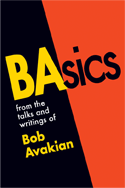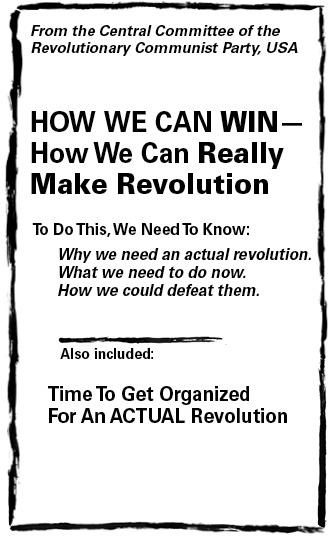“Reform or Revolution?” Digging into Bob Avakian’s Essay at Revolution Books
| Revolution Newspaper | revcom.us
We received this report from a reader on a recent discussion at Revolution Books in Berkeley:
After introducing the bookstore and Bob Avakian (BA) to people, I started by posing the contradiction between the magnitude of the problems humanity faces and the pathetic reform “solutions” we are offered. For example, we face systematic and systemic police murder of Black and Brown people, yet are told to rely on police review boards, body cameras, and more Black elected officials! We face catastrophic environmental destruction, yet are told to “solve” this problem by recycling our personal products, eating organic, and green capitalism! The richest 42 people in the world own more wealth than the poorest half of humanity, etc. I emphasized the importance of digging into the question of reform and revolution, proceeding from what it’s really gonna take to solve these monumental problems.
A couple of Chinese students spoke about how they were intrigued seeing that there is a Revolutionary Communist Party in the U.S. They were skeptical about the idea of revolution, but wanted to learn more. A USC student said she’s very concerned about the environment and is starting to see the limits of reforms. She’s become disillusioned with environmental nonprofits, but is still unsure of revolution because she “doesn’t like violence.” A UNC student who is studying business but doesn’t really believe in it, has had her eyes opened by traveling around the world, and wants to learn more about revolution. What stood out was people’s seriousness in engaging these questions, which continued throughout the discussion, and their openness to revolution.
We read the essay from Bob Avakian’s BAsics, “Reform or Revolution: Questions of Orientation, Questions of Morality,” aloud together. I asked what people thought of the analogy BA lays out about the plague and antibiotics being hoarded and guarded by armed thugs and only distributed for profit, and the two alternatives in that situation—putting wet towels on people’s foreheads to ease their suffering, or organizing people to storm the compound to seize the antibiotics and distribute them among the people.
One of the Chinese students said this made him wonder whether, even if the “antibiotics” were liberated, there would be enough for everyone: Is the problem that things are only distributed for profit, or is it lack of resources? A young European woman said that she wants to seize the “antibiotics” but worries the armed guards will turn it into a bloodbath, so maybe there’s some way they could be convinced, or some compromise could be arranged. A couple of people thought the main obstacle standing in the way of people rising up and seizing the “antibiotics” is not armed thugs, but media propaganda and brainwashing. Others agreed with the analogy and united with the need for revolution, especially a woman from the Middle East.
I talked about the fundamental contradiction in the world: the globalized networks of production and vast socially produced wealth on the one hand, and the private ownership and private appropriation of that wealth on the other hand. This causes totally unnecessary suffering, some of which I brought alive through vivid agitation. The material basis exists to have a common abundance if that contradiction is resolved through an actual revolution. I also referred people to the Constitution for the New Socialist Republic in North America. In terms of how the armed thugs could actually be defeated, I referred people to HOW WE CAN WIN.
I asked people why they thought BA focused on the question of morality in relation to the question of reform or revolution. The woman from the Middle East spoke very powerfully to the moral responsibility we have for revolution, including because “who knows if there will be any Middle East left” if things keep going as they are. She said people in her country are locked out of access to information about the revolution like we were getting into and that people living in this country who have access to this knowledge have a responsibility to act on it in the interest of the whole world.
After the main discussion was over, a bunch of the students stuck around, excited and eager to keep talking. A couple of them wanted to hook up with the Revolution Club right away. Others wanted to stay connected to Revolution Books and learn more. A couple of the Chinese students, who really wanted to sort out what happened with communism in China, and learn more about the new communism developed by Bob Avakian, picked up the interview with Raymond Lotta, “You Don’t Know What You Think You ‘Know’ About... The Communist Revolution and the REAL Path to Emancipation: Its History and Our Future.” The woman from the Middle East commented that she liked the frankness of the discussion and directness of the revolutionaries. She had been in a European country where she said there is a tendency for political discussions to be very polite and shallow, where harsh truths are covered over. She also said she liked that we were talking about the whole world.
There is nothing more unrealistic than the idea of reforming this system into something that would come anywhere near being in the interests of the great majority of people and ultimately of humanity as a whole.
Bob Avakian, BAsics 3:2
"You can't change the world if you don't know the BAsics." Find out more here
Get a free email subscription to revcom.us:

Volunteers Needed... for revcom.us and Revolution
If you like this article, subscribe, donate to and sustain Revolution newspaper.


